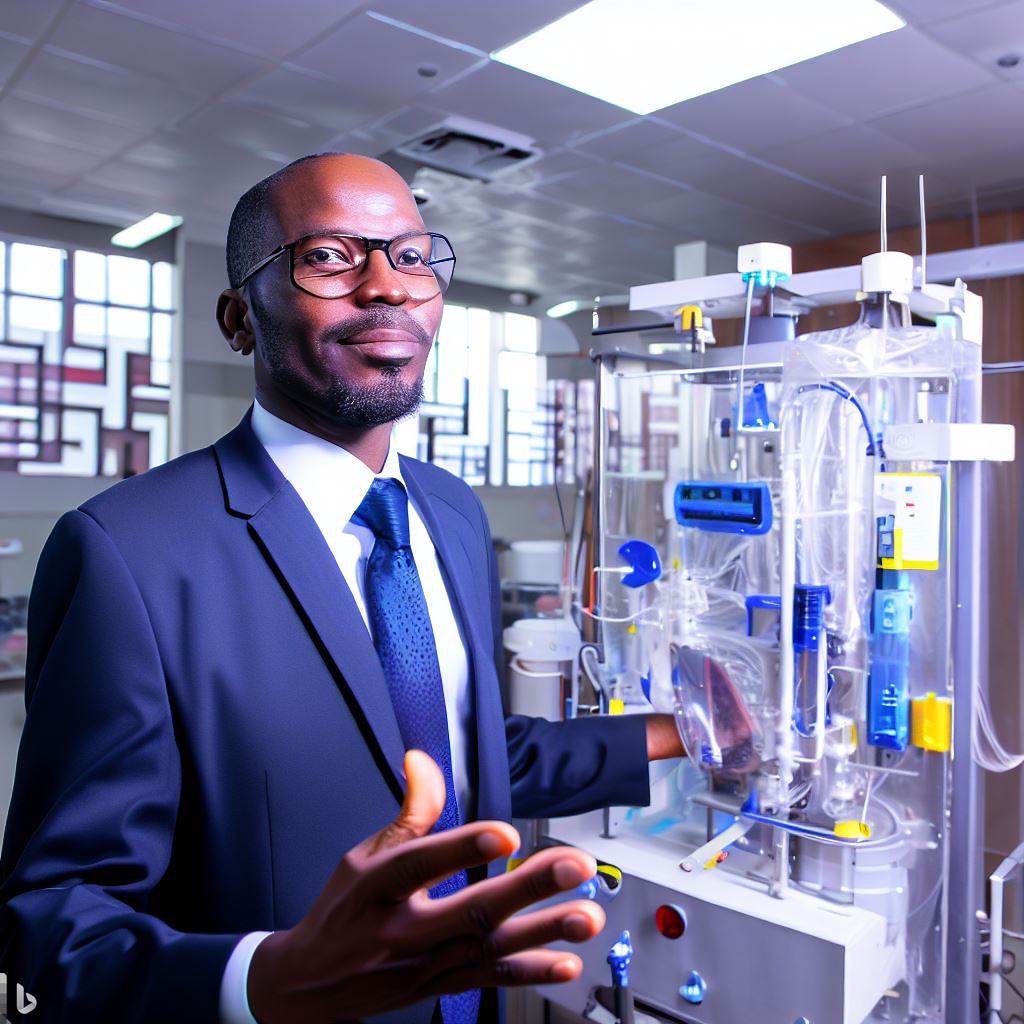Introduction
A professional body is an organization that represents and regulates a specific profession or industry.
It provides support, guidance, and opportunities for its members to enhance their professional development.
Professional bodies are essential for biomedical engineers as they promote high standards, ethics, and best practices within the field.
They also offer networking opportunities, access to resources, and professional recognition.
The topic of this blog post is the professional bodies for biomedical engineers in Nigeria.
In Nigeria, there are several professional bodies dedicated to supporting and advancing the field of biomedical engineering.
These professional bodies in Nigeria provide a platform for biomedical engineers to collaborate, share knowledge, and stay updated with the latest advancements in the field.
They organize conferences, seminars, and workshops to facilitate learning and professional growth.
Some notable professional bodies in Nigeria for biomedical engineers include the Nigerian Institution of Biomedical Engineering and the Biomedical Engineering Society of Nigeria.
These bodies strive to enhance the professional development of biomedical engineers, ensuring the delivery of quality healthcare services in the country.
All in all, professional bodies play a crucial role in the career development of biomedical engineers in Nigeria.
They provide a supportive environment, promote professional standards, and offer valuable resources.
Biomedical engineers should actively engage with these bodies to maximize their potential and contribute to the growth of the field.
The Role of Professional Bodies
Professional bodies play a crucial role in the field of biomedical engineering in Nigeria, acting as the backbone of the profession’s growth and development.
These bodies are established to bring together professionals in the field and provide them with a platform to collaborate, share knowledge and best practices, and contribute to the advancement of the field.
Setting industry standards and regulations
One of the primary roles of professional bodies is to establish and enforce industry standards and regulations.
This ensures that biomedical engineers in Nigeria adhere to a set of defined guidelines and ethical principles when practicing their profession.
These standards help maintain quality, safety, and consistency in the field.
Promoting professional development
Professional bodies are dedicated to promoting continuous professional development among biomedical engineers.
They organize training programs, workshops, and conferences to enhance the knowledge and skills of their members.
These initiatives not only keep professionals up-to-date with the latest advancements but also facilitate their career growth.
Advocating for the interests of biomedical engineers
Professional bodies act as a collective voice for biomedical engineers, advocating for their rights, interests, and welfare.
They engage with government bodies, regulatory authorities, and other stakeholders to address issues affecting the profession, such as licensing requirements, recognition of qualifications, and fair employment practices.
Providing networking opportunities
Professional bodies create platforms for biomedical engineers to network and build relationships with peers, experts, and industry leaders.
These networking opportunities help in knowledge exchange, collaboration on projects, and mentorship, ultimately fostering professional growth and expanding career prospects.
In essence, professional bodies for biomedical engineers in Nigeria play a significant role in shaping the profession and driving its growth.
They establish industry standards, promote continuous professional development, advocate for the interests of biomedical engineers, and provide networking opportunities.
Aspiring and practicing biomedical engineers should actively engage with these bodies to leverage the benefits they offer and contribute to the development of the field.
Professional Bodies for Biomedical Engineers in Nigeria
Nigerian Institute of Biomedical Engineering (NIBE)
- Background and history: NIBE was established in 2009 as a professional body for biomedical engineers in Nigeria.
- Membership requirements and benefits: To become a member, one must have a biomedical engineering degree and pay annual dues. Members enjoy networking opportunities, access to resources, and professional development programs.
- Activities and programs offered: NIBE organizes conferences, seminars, and workshops to promote knowledge sharing and advancement in the field. They also offer certifications and accreditation for biomedical engineering programs.
Biomedical Engineering Society of Nigeria (BESN)
- Establishment and purpose: BESN was founded in 2006 to promote the development and application of biomedical engineering in Nigeria.
- Membership criteria and advantages: Membership is open to individuals and organizations involved in biomedical engineering, and it offers networking opportunities, access to research grants, and career support.
- Conferences, workshops, and research initiatives: BESN organizes national and international conferences, workshops, and seminars to facilitate knowledge exchange, showcase research, and promote collaboration among professionals.
Association for the Advancement of Medical Instrumentation (AAMI)
- Introduction to AAMI: AAMI is an international professional association dedicated to the advancement of medical instrumentation.
- Collaboration with Nigerian biomedical engineers: AAMI collaborates with Nigerian biomedical engineers to share best practices, provide training, and support regulatory standards in medical technology.
- Global networking and professional resources: AAMI offers a platform for Nigerian biomedical engineers to connect with global professionals, access educational materials, and stay updated with the latest industry trends.
Professional Bodies for Biomedical Engineers in Nigeria play a pivotal role in fostering the advancement of this field.
They serve as crucial platforms for networking, knowledge sharing, and career progression.
Membership in these bodies not only boosts professional credibility but also unlocks diverse opportunities, perks, and resources.
The Nigerian Institute of Biomedical Engineering (NIBE), founded in 2009, cultivates a vibrant community of professionals with biomedical engineering degrees.
NIBE offers access to networking events, career development initiatives, and growth-enhancing resources.
The Biomedical Engineering Society of Nigeria (BESN), established in 2006, empowers individuals and organizations in this domain.
It provides benefits like research grants, career guidance, and networking through conferences and workshops.
Furthermore, the Association for the Advancement of Medical Instrumentation (AAMI) contributes significantly by collaborating with Nigerian biomedical engineers to share expertise and uphold regulatory standards.
These professional bodies bolster the recognition and development of biomedical engineers in Nigeria.
They facilitate collaboration, career enrichment, and access to resources that elevate biomedical engineering practice.
Active participation can propel careers and contribute to healthcare technology advancement in Nigeria.
Read: Biomedical Engineering: Building a Sustainable Future in Nigeria
Benefits of Joining a Professional Body
A biomedical engineer in Nigeria can avail numerous benefits by joining a professional body. Some of the key benefits are:
Access to knowledge sharing and resources
- Professional bodies provide a platform where biomedical engineers can share and exchange knowledge.
- Members gain access to research papers, journals, and other resources that can enhance their expertise.
- Networking with peers in the field leads to valuable discussions and learning opportunities.
Career advancement opportunities
- Being a part of a professional body opens doors to career development programs and workshops.
- Members can attend conferences, seminars, and webinars to stay updated with the latest advancements.
- Job placement services and mentorship programs provide guidance for career growth.
Continuing professional development
- Professional bodies offer continuous learning opportunities through training programs and workshops.
- Members can earn Continuing Professional Development (CPD) points to enhance their skills.
- CPD activities help biomedical engineers stay up-to-date with the rapidly evolving field.
Contribution to the field and professional recognition
- By actively participating in a professional body, biomedical engineers contribute to the advancement of the field.
- Members have the opportunity to present their research, innovations, and ideas to a wider audience.
- Recognition from peers and industry experts can boost professional credibility and reputation.
- Opportunities to publish papers and articles in professional journals can increase visibility and impact.
In fact, joining a professional body for biomedical engineers in Nigeria brings numerous benefits.
It provides access to valuable knowledge sharing, resources, and networking opportunities.
Members can avail career advancement programs, continuous professional development, and gain recognition in the field.
Therefore, it is highly recommended for biomedical engineers to become a part of a professional body to enhance their professional growth and contribute to the field.
Read: Career Paths for Biomedical Engineers in Nigeria

Challenges Faced by Professional Bodies in Nigeria
Limited awareness and participation
- Professional bodies for biomedical engineers in Nigeria face the challenge of limited awareness among practitioners and the general public.
- There is a lack of understanding regarding the importance and benefits of being a member of a professional body.
- Many biomedical engineers in Nigeria are not aware of the existence of professional bodies in their field.
- As a result, there is a low level of participation, which hinders the effectiveness and impact of these professional bodies.
- Efforts should be made to raise awareness through targeted campaigns, workshops, and collaborations with educational institutions.
Funding constraints
- Professional bodies for biomedical engineers in Nigeria often face challenges in securing adequate funding for their activities.
- The lack of sufficient financial resources hinders the implementation of projects, programs, and initiatives.
- Membership fees alone are not enough to sustain the operations and growth of these professional bodies.
- External funding sources, partnerships with industry, and government support are necessary to overcome these funding constraints.
- Proactive efforts should be made to garner financial resources through grants, sponsorships, and fundraising activities.
Policy and regulatory issues
- Biomedical engineering professional bodies in Nigeria face challenges related to policy and regulatory issues.
- There is a lack of clear guidelines and regulations governing the practice of biomedical engineering in the country.
- This lack of regulation leads to a lack of standardization and professional accountability.
- Professional bodies must engage with policymakers and regulatory agencies to advocate for the development and implementation of clear guidelines.
- Collaboration with government bodies and relevant stakeholders is crucial to address these policy and regulatory challenges.
Lack of national coordination
- The absence of national coordination poses a significant challenge for professional bodies for biomedical engineers in Nigeria.
- There is a lack of a unified platform for communication, collaboration, and knowledge sharing among these bodies.
- This lack of coordination leads to duplication of efforts, fragmented initiatives, and limited impact.
- Efforts should be made to establish a national network or umbrella organization that brings together all professional bodies in biomedical engineering.
- Through effective coordination, these bodies can work together towards common goals and enhance their overall effectiveness.
In short, professional bodies for biomedical engineers in Nigeria face several challenges that hinder their effectiveness and impact.
Limited awareness and participation, funding constraints, policy and regulatory issues, and lack of national coordination all contribute to these challenges.
However, proactive measures such as raising awareness, seeking external funding, engaging with policymakers, and establishing national coordination can help overcome these challenges and strengthen the role of professional bodies in promoting and advancing biomedical engineering in Nigeria.
Read: Working Conditions for Biomedical Engineers in Nigeria
How Professional Bodies Can Overcome Challenges
Collaboration with educational institutions
- Establishing partnerships with universities and colleges to offer relevant courses and training.
- Working closely with academic institutions to develop curriculum that aligns with industry needs.
- Organizing seminars, workshops, and conferences to bridge the gap between academia and industry.
- Providing resources and support to promote research and innovation in biomedical engineering.
Engaging with government bodies and policymakers
- Advocating for policies that promote the growth and recognition of biomedical engineering as a profession.
- Collaborating with regulatory bodies to establish standards and guidelines for practicing biomedical engineers.
- Participating in discussions and consultations on healthcare policies and regulations.
- Providing expertise and recommendations to support decision-making processes related to biomedical engineering.
Offering scholarships and grants for members
- Providing financial assistance to members pursuing further education or professional development.
- Establishing scholarship programs to attract talented individuals to the field of biomedical engineering.
- Awarding grants for research projects that contribute to advancements in the field.
- Recognizing and rewarding outstanding achievements and contributions of members through monetary incentives.
Enhancing public awareness through outreach programs
- Organizing events and workshops to educate the public about the role and importance of biomedical engineering.
- Partnering with healthcare facilities and organizations to provide free health screenings and consultations.
- Creating informative materials and resources to disseminate accurate information about biomedical engineering.
- Collaborating with media outlets to raise awareness through interviews, articles, and documentaries.
By implementing these strategies, professional bodies can overcome challenges and effectively support the growth of biomedical engineering in Nigeria.
Collaboration with educational institutions ensures that students receive quality education and relevant skills.
Engaging with government bodies and policymakers helps create an enabling environment for the profession.
Offering scholarships and grants encourages members to excel and pursue further education.
Enhancing public awareness creates a positive perception of biomedical engineering within the society.
Read: Diversity in Biomedical Engineering: Nigeria’s Perspective
Conclusion
The pivotal significance of professional bodies in propelling the progress of biomedical engineering in Nigeria cannot be overstated.
Their active involvement is a catalyst for growth, ensuring the evolution and recognition of the field.
The strong recommendation for biomedical engineers in Nigeria is to actively engage with and lend support to these esteemed professional bodies.
By doing so, they can tap into a wealth of opportunities for learning, networking, and contributing to the profession’s enrichment.
Urgent action and enthusiastic participation are key to nurturing the stature of the biomedical engineering discipline within Nigeria.
Each individual’s proactive contributions collectively elevate the profession, fortifying its standing and influence.
In review, the collaboration between biomedical engineers and these professional bodies forms an indispensable synergy for the advancement of biomedical engineering in Nigeria.




